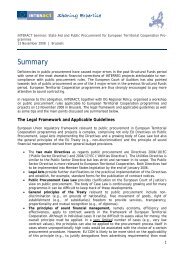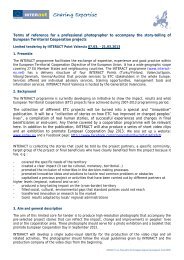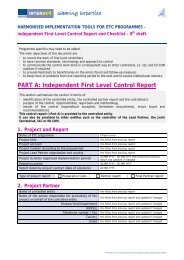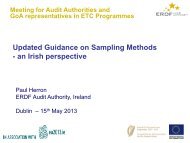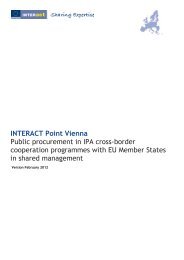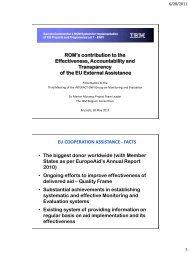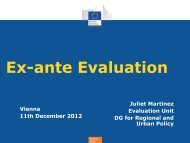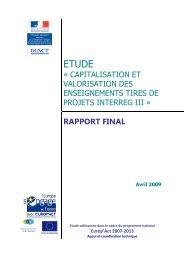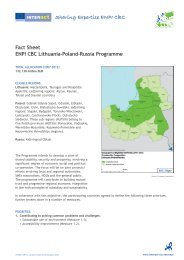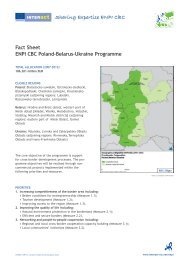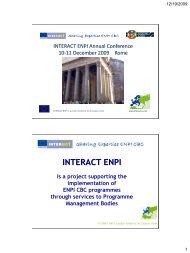VADEMECUM COMMUNITY RULES ON STATE AID - Interact
VADEMECUM COMMUNITY RULES ON STATE AID - Interact
VADEMECUM COMMUNITY RULES ON STATE AID - Interact
Create successful ePaper yourself
Turn your PDF publications into a flip-book with our unique Google optimized e-Paper software.
FICHE 8<br />
TRAINING <strong>AID</strong><br />
Reference<br />
This fiche summarizes the “Commission Regulation (EC) No 68/2001 of 12 January 2001 on<br />
the application of Articles 87 and 88 of the EC Treaty to training aid” as later amended<br />
(Official Journal No L 10, 13.1.2001, p.20) (hereinafter in this fiche the “Regulation”).<br />
Scope<br />
The regulation covers all public support for training which favours one or more firms or<br />
sectors of industry by reducing costs they should normally have to bear when they want their<br />
employees to acquire new skills. The regulation applies to training aid whether the training is<br />
provided by companies themselves or by public or private training centres. Examples of<br />
training measures which do not constitute State aid:<br />
■ schooling and initial training (incl. apprenticeships and day release schemes);<br />
■ training of unemployed people, including traineeships in enterprises The regulation<br />
applies to all sectors.<br />
Concepts<br />
Specific training: Training involving tuition directly and principally applicable to the<br />
employee’s present or future position in the assisted firm and providing qualifications which<br />
are not or only to a limited extent transferable to other firms or fields of work.<br />
General training: Training involving tuition which is not applicable only or principally to the<br />
employee’s present or future position in the assisted firm, but which provides qualifications<br />
which are largely transferable to other firms or fields of work and thereby substantially<br />
improve the employability of the employee. Training is considered ‘general’ if, e.g. it is<br />
jointly organised by different independent enterprises, or if employees of different enterprises<br />
may avail themselves of the training. It is also considered ‘general’ if it is recognised,<br />
certified or validated by public authorities or bodies on which the Member State or the<br />
Community conferred the necessary powers.<br />
Eligible cost<br />
• trainers’ personnel costs;<br />
• trainers’ and trainees’ travel expenses;<br />
• other current expenses (materials, supplies, etc.);<br />
• depreciation of tools and equipment, to the extent that they are used exclusively for the<br />
• training scheme in question;<br />
• cost of guidance and counseling services with regard to the training project;<br />
• trainees’ personnel costs up to the amount of the total of the above eligible costs.<br />
36



